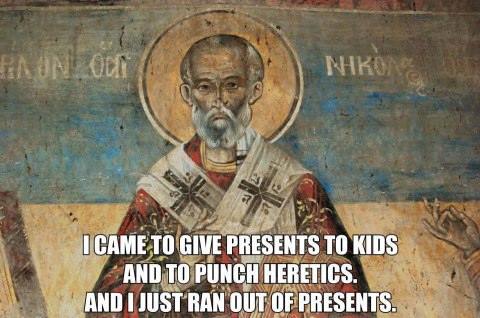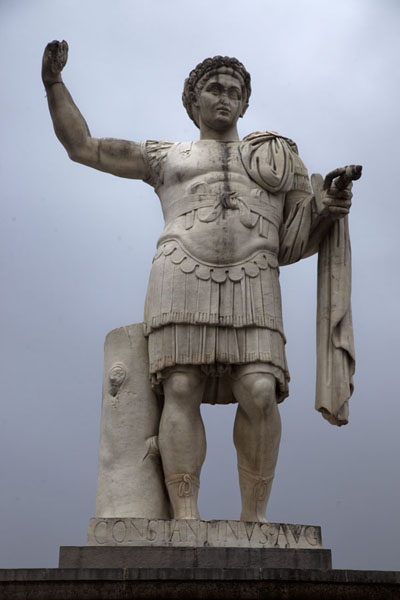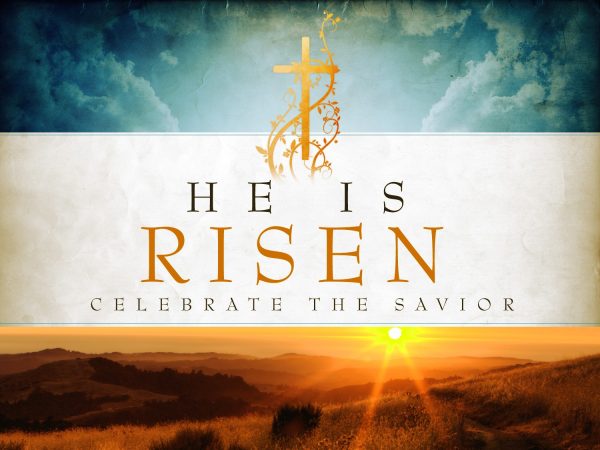I have yet to meet anyone that demands that I celebrate Christmas on December 25th because it is the exact date when Jesus was born. The important thing is that Jesus was born on earth to become one of us. Celebrating his birth on a specific date in December or January (if you are an Orthodox Christian) is not a measure of piety or Christian orthodoxy. Contrast that with what you are about to read about Easter and Passover. It seems like some Protestant groups are always looking for ways to unchurch the rest of us. As you read this, I hope you keep this in mind…
If you thought we only swat Liberals on this blog, you’d be wrong. What follows is the result of an Easter weekend post on World Net Daily (WND) by the editor’s wife, Elizabeth. Before I get into this, let me just disclose that in the last days of the Sacramento Union that I knew Joe Farah and briefly worked for the Union. I even had an Op-Ed published in the paper. When the Union shutdown, Farah left the area and moved north—to Oregon I think—and started WND.
I will be commenting on three different articles, the first of which is: Constantine’s shocking letter on Passover dating and the Jews
Claim, First Schism in the church
Elizabeth Farah starts her video with the claim that the topic that she wished to discuss (keeping Passover v Easter) was the first major schism of the Church. This is demonstrably false; the first schism was over Judaizes. Did Gentiles first need to become Jews and then Christians? Was circumcision, etc. necessary? In the 15th chapter of the Book of Acts, this issue necessitated the first church council in Jerusalem. Judaizes were a constant problem in the First Century Church.
“Keep the Passover of Jesus”
“The fact that most of ecclesia or churches of God kept Passover. It is important to remember. Rome’s will was to eradicate Passover and replace it with Easter; despite Jesus’ command to keep the feast and do this in remembrance of me.” Elizabeth Farah timestamp 8:10-33
“By the way, this is a biblical command not a custom.” Farah 17:31-35
Speaking of keeping the 14th day of the first month, “That was the Lord’s Command.” Farah 18:30-32
Farah is offended that Constantine wanted the Church to “separate themselves from the customs of the Jews”.
Farah thinks that we need to bless Israel (the Jewish people); however; the New Testament makes it plain that the Church is Israel. Or to paraphrase David Chilton, God divorced Israel for infidelity and took to himself a new bride, a new people, the Church. The Church is the new Israel.
Farah repeatedly tries to repudiate the Church Council of Nicaea by calling it a minority, which also undermines the legitimacy of the Creed. I find this very problematic and arguably just as intellectually lazy as parts of Constantine’s reasoning for adopting Easter. Constantine could have advocated regularizing fragmented practices of worship without dumping on the Jews but he didn’t.
At the end of her presentation, Farah also tries some bait and switch tactics to buttress her argument. She ignores that the Council was unanimous in its support of adopting Easter as a Christian feast and tries to flip it that Constantine is claiming that his will on the matter is God’s will. This is wrong. Anybody that has any experience with Churches making important decisions knows that a unanimous vote is understood as a group finding God’s will on the matter. In his letter, Constantine is simply repeating the declaration of the Council and using the vote to call for normalizing the practice throughout the Empire.

Farah is not the only person that you can find on the Internet promoting this understanding of Passover and Easter.
Many of the arguments on this topic seem rooted in strange interpretations of Scripture tied to the idea of the Regulative Principle of Scriptural interpretation. This idea is often invoked when people look at the Bible’s ideas of things like proper worship and moral behavior. Basically, the Regulative Principle of Scriptural interpretation is if it’s in the Bible we do it and if not, then we don’t. Some Protestant groups go further and say if it’s not specifically in the New Testament them we don’t follow it.
If you take this belief literally (especially limiting yourself to the New Testament), you can get some strange and theologically pretzel-like beliefs. For example, bestiality in only prohibited in the Old Testament but is not mentioned—let alone prohibited—in the New. Musical instruments are often mentioned as part of worship in the Old Testament but the New is silent on this topic, so what is the correct practice? This idea, especially when trying to divide the Bible against itself, results in crazy stuff.
You can see this belief being applied in the next article and when it is, in parts it’s gut splittingly funny.
The Apostle Paul confirms he maintained the customary observance of Passover, as was given to him by Christ Himself, when he said, “For I received of the Lord Jesus the same night in which he was betrayed [not Easter Sunday!] took bread” (1 Corinthians 11:23).
HOW WAS PASSOVER REPLACED BY EASTER… AND WHO DID IT?
Ok, here is a twisted understanding of the Lord’s Supper. Yes, the first time Jesus celebrated it was on Passover, but the early church did this celebration every week, and not on the Sabbath to boot. The practice of the early church was to meet on the first day of the week—a regular workday for their society—and meet in the evening for a feast. In the Corinthians passage cited above, Paul was scolding them for abuses in how they were doing it. Some were eating too much and other were starving. At the conclusion of the feast, they would then celebrate Communion, Eucharist, the Lord’s Supper, or whatever your group wants to call it. Contrary to the claim above, this was not a once-a-year activity. It was weekly.
For as often as ye eat this bread, and drink this cup, ye do shew the Lord’s death till he come.
1 Corinthians 11:26

The absolute proof that Christians shouldn’t celebrate Easter is this next quote:
It is important we remember: Jesus Christ never kept an Easter in His life! Unequivocally, it is undeniable that Easter has no Biblical connection, foundation, or authority on the name of Jesus Christ that requires observance and/or recognition by any who claim Christ as their Savior.
Yep, Jesus never celebrated his own Resurrection while he was alive on earth and thus, we shouldn’t either. This, folks is the Regulative Principle of Scriptural interpretation in action. Just because Jesus rose on the first day of the week and the early church met on that day to worship has no bearing on the issue. Oh, while he was alive, Jesus worshipped on the Sabbath not the first day of the week. Remember when I said the Regulative Principle can tie you up in intellectual pretzels?
Later the author comments on the results of the Council of Nicaea:
It was now made “official”: Easter Sunday, the day after the first full moon, after the spring equinox, became the day to celebrate Jesus Christ’s resurrection. This was a serious and critical shift of theology. Critical, because it not only changed the day of the observance, but changed the focus, the meaning of the observance. It now became an observance and celebration of His resurrection, contrary to the Biblical admonition of remembering His death!
The author now claims that Christians celebrating the Resurrection is contrary to biblical admonition. So dear author, why were they meeting on the first day of the week for worship if celebrating the resurrection of our Lord is wrong? I don’t know about your church, but my preference is to celebrate a meal with Christ every time we worship not once a year. Christians celebrate both Jesus’ death and his resurrection. Trying say we can only pick only one is the unbiblical position. This is the logical fallacy of the false dilemma.
Lest you think I exaggerate read on:
Notice what Paul says, “For as often as ye eat this bread, and drink this cup, ye do shew the Lord’s death [not His resurrection] till he come” (1 Corinthians 11:26). There is a purposeful point of significance our Lord placed exclusively on Passover concerning His death. It’s very fundamental, but crucial to understand; Passover was intended to distinctly address the impeccable fact that it was by Jesus Christ’s sacrificed life and shed blood that we have access to eternal life. Unfortunately, merging His death and resurrection into one holy day, as Easter describes, blurs the deep profound meaning of both these events by taking away the emphasis that each so richly deserves.
This guy again opens his mouth and removed all doubt about how foolish his argument is. Most of the Christian Church celebrates both Good Friday and Easter. We do not merge “His death and resurrection into one holy day, as Easter describes…” This is the logical fallacy of the strawman.
The reality is that many churches have Holy Week services on almost every day of that week. Starting with Palm Sunday, Maundy Thursday, Good Friday, a Saturday Easter vigil, and Easter (or Resurrection) Sunday.
If you want to read yet another article on the subject, try this one.
Constantine’s Easter Controversy with the Quartodecimen
This article is written by a group claiming to be neither Christian nor Jewish. They call themselves the Natsarim. It has a lot of information and claims not only all the stuff that you read already about the Passover but claims that the modern Jewish way of reckoning the Passover is wrong as well; talk about a pox on both your houses! This article also quotes the full letter by Constantine.
All three articles seem to agree that abandoning a lunar calendar for a solar one was a bad idea and dumping a Passover celebration in favor of Easter was even worse. In Constantine’s letter, it is clear that the Jewish people were not generally liked by Christians in the West.
Comments
I could go deeper into this subject, but I think this post is long enough as it is so I’m going to wrap it up with some Scriptures that illustrate that the articles mentioned above are cherry picking arguments that can’t stand up before the biblical record. Farah and her fellow travelers will find the New Testament is not in agreement with their claims.
Regarding days is a matter of personal liberty
Let no man therefore judge you in meat, or in drink, or in respect of an holyday, or of the new moon, or of the sabbath days:
Colossians 2:16
One man esteemeth one day above another: another esteemeth every day alike. Let every man be fully persuaded in his own mind. He that regardeth the day, regardeth it unto the Lord; and he that regardeth not the day, to the Lord he doth not regard it. He that eateth, eateth to the Lord, for he giveth God thanks; and he that eateth not, to the Lord he eateth not, and giveth God thanks.
Romans 14: 5 & 6
But now, after that ye have known God, or rather are known of God, how turn ye again to the weak and beggarly elements, whereunto ye desire again to be in bondage? Ye observe days, and months, and times, and years. I am afraid of you, lest I have bestowed upon you labour in vain.
Galatians 4:9-11
Christ our Passover
For even Christ our passover is sacrificed for us: Therefore let us keep the feast, not with old leaven, neither with the leaven of malice and wickedness; but with the unleavened bread of sincerity and truth.
I Corinthians 5:7b-8
Clearly these verses use Passover imagery, but to trying to limit their application to one day a year is a misreading of the text and wrenching them out of context. Paul is contrasting the way that people live, not discussing a literal Passover celebration.
The Bible makes it clear that Christ was both the Lamb sacrificed for us and also the High Priest. He died once for all and is seated at the righthand of the Father. We remember his words each time we gather together to eat the Lord’s Supper not just once per year.
Jesus raised on first day of the week
In the end of the sabbath, as it began to dawn toward the first day of the week, came Mary Magdalene and the other Mary to see the sepulchre.
Matthew 28:1
And very early in the morning the first day of the week, they came unto the sepulchre at the rising of the sun.
Mark 16:2
Now when Jesus was risen early the first day of the week, he appeared first to Mary Magdalene, out of whom he had cast seven devils.
Mark 16:9
Now upon the first day of the week, very early in the morning, they came unto the sepulchre, bringing the spices which they had prepared, and certain others with them.
Luke 24:1
The first day of the week cometh Mary Magdalene early, when it was yet dark, unto the sepulchre, and seeth the stone taken away from the sepulchre.
John 20:1
Jesus appeared to the disciples on the first day
Then the same day at evening, being the first day of the week, when the doors were shut where the disciples were assembled for fear of the Jews, came Jesus and stood in the midst, and saith unto them, Peace be unto you.
John 20:19
And upon the first day of the week, when the disciples came together to break bread, Paul preached unto them, ready to depart on the morrow; and continued his speech until midnight.
Acts 20:7
Upon the first day of the week let every one of you lay by him in store, as God hath prospered him, that there be no gatherings when I come.
1 Corinthians 16:2
Conclusion
The actual date of Jesus’ birth, baptism, death, or resurrection or other event in his life is secondary to the reality that it happened. Creating a false dilemma over celebrating the Passover or his Resurrection is trivial. The truth is many Christians celebrate both events in his life and more. Saying that we shouldn’t celebrate his resurrection because Jesus didn’t is a stupid claim.
Clearly Jesus worshipped on the Sabbath, but his followers worshipped on the first day of the week. Were his Apostles incapable of following his example?
If following Jewish law and custom was so darn important then why did the disciples decide that Gentiles didn’t need to be circumcised, keep the sabbath, or follow the dietary laws?
The truth is that Passover was a shadow and a type of symbol of the work that Jesus completed on the cross. He is our Passover Lamb. His was a sacrifice once and for all. He is our High Priest. He is seated at the righthand of the Father making intercession for us. We come to him not on the basis of keeping rules or festivals but by way of his blood shed in our place.
Whenever we gather in worship, we should gather around his table as he instructed.
For I have received of the Lord that which also I delivered unto you, That the Lord Jesus the same night in which he was betrayed took bread:
And when he had given thanks, he brake it, and said, Take, eat: this is my body, which is broken for you: this do in remembrance of me.
After the same manner also he took the cup, when he had supped, saying, This cup is the new testament in my blood: this do ye, as oft as ye drink it, in remembrance of me.
For as often as ye eat this bread, and drink this cup, ye do shew the Lord’s death till he come.
I Corinthians 11:23-26
In the early church, remembering his death was a weekly occurrence not an annual one.
Jews and Gentiles all come to the Father thru Jesus Christ or not at all.
Jesus saith unto him, I am the way, the truth, and the life: no man cometh unto the Father, but by me.
John 14:6.
It is a myth in certain Protestant sects that Jews have special treatment and need not bow the knee to King Jesus to go to Heaven. Such ideas are sentimental crap and damnable heresy.
Efforts to unchurch the rest of us for using the wrong calendar or celebrating the Resurrection of Jesus, are efforts not spent spreading the Gospel of Jesus Christ.
